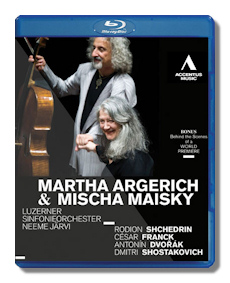
The Internet's Premier Classical Music Source
Related Links
-
Dvořák Reviews
Franck Reviews
Shchedrin Reviews
Shostakovich Reviews - Latest Reviews
- More Reviews
-
By Composer
-
Collections
DVD & Blu-ray
Books
Concert Reviews
Articles/Interviews
Software
Audio
Search Amazon
Recommended Links
Site News
 Blu-ray Review
Blu-ray Review
Shchedrin World Première

- Antonín Dvořák:
- Scherzo capriccioso, Op. 66, B. 131
- Rodion Shchedrin:
- Double Concerto "Romantic Offering" for Piano & Cello
- César Franck:
- Violin Sonata in A Major, M. 8 (arr. for cello & piano)
- Dmitri Shostakovich:
- Symphony #9 in E Flat Major, Op. 70
Martha Argerich, piano
Mischa Maisky, cello
Lucerne Symphony Orchestra/Neeme Järvi
Recorded live at the Concert Hall of the Culture & Convention Center (KKL), Lucerne, Switzerland – February 9 & 10, 2011.
Bonus feature: Behind the Scenes of a WORLD Première
Accentus Music Blu-ray ACC10224 LPCM Stereo Dolby Digital DTS Anamorphic Widescreen
Also available on DVD ACC20224: Amazon - UK - Germany - Canada - France - Japan - ArkivMusic - CD Universe - JPC
The centerpiece of the program here is Shchedrin's new Double Concerto, subtitled "Romantic Offering". Indeed, the bonus track, "Behind the Scenes of a WORLD première", is devoted largely to Shchedrin and this composition. The work is interesting, if a bit austere in its lyricism and dark character. It's not avant-garde or even daring by today's standards, but neither is it as approachable as the concertos of the composer's countrymen Prokofiev and Shostakovich. Shchedrin (b. 1932) was thought by many to be the successor to Shostakovich in Russia and his reputation may yet live up to that hope. Listening to this new work, with its promising subtitle, I can just hear the composer's naysayers charging it's not Romantic and not much of an offering. But that assessment would be quite unfair.
There is a songful lyricism in the first movement (Moderato quasi Andantino), often heard with the piano in the lower ranges dancing playfully to the main theme in the right hand. There is much tension and angst in both the ensuing Allegro and closing Sostenuto assai. The piano writing is sometimes reminiscent of Stravinsky's, but it is not imitative. The piano rather dominates the proceedings, though the cello has plenty to do. The composer wrote the work with Argerich and Maisky in mind and the pair deliver the goods in this performance. We know this because Shchedrin comes up on stage at the end for bows, kisses both of Argerich's hands and then kneels before her. He expresses gratitude to Maisky next, and then to Järvi and the concertmistress. Shchedrin certainly approved of the performance, and so his fans and others should like his "offering".
The other works are given fine performances too. The opening work, Scherzo Capriccio, is played with plenty of spirit and color, and the Franck Sonata, arranged from the violin sonata, finds Argerich and Maisky in splendid form. The Shostakovich Ninth, perhaps the composer's lightest symphony, is actually among the better of them. Here Järvi, who has recorded all fifteen Shostakovich symphonies, split between Chandos and DG, turns in a fine reading, though I thought the closing of the finale sounded a bit routine. Still, the overall performance is good. The sound is excellent in all works and the camera work splendid.
The bonus feature is fascinating: Shchedrin, nearly seventy-nine when it was made, is quite a likeable fellow, and quite lively in his exchanges with Argerich, Maisky and Järvi during rehearsals. There is some humor in the proceedings too: in one clip, also during rehearsals, Maisky dances comically off the stage to the jocular bassoon music at the opening of the Shostakovich Ninth finale. This was a most enjoyable disc, a must for Shchedrin's admirers and those wanting to explore new territory.
Copyright © 2011, Robert Cummings





















